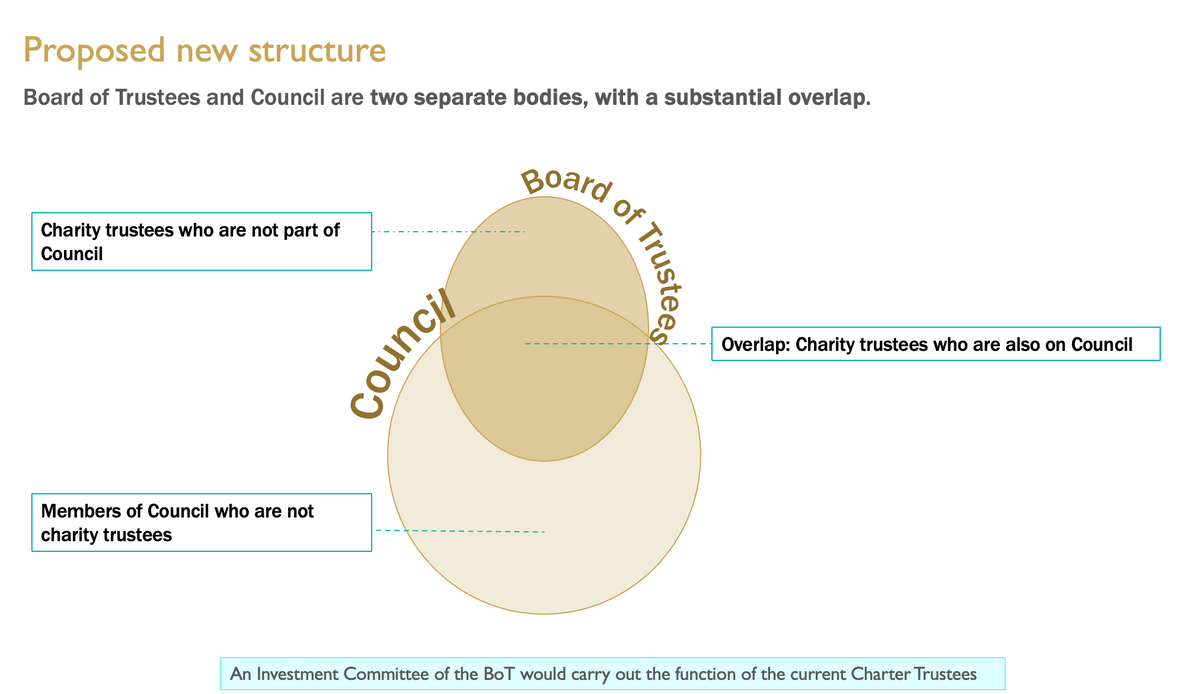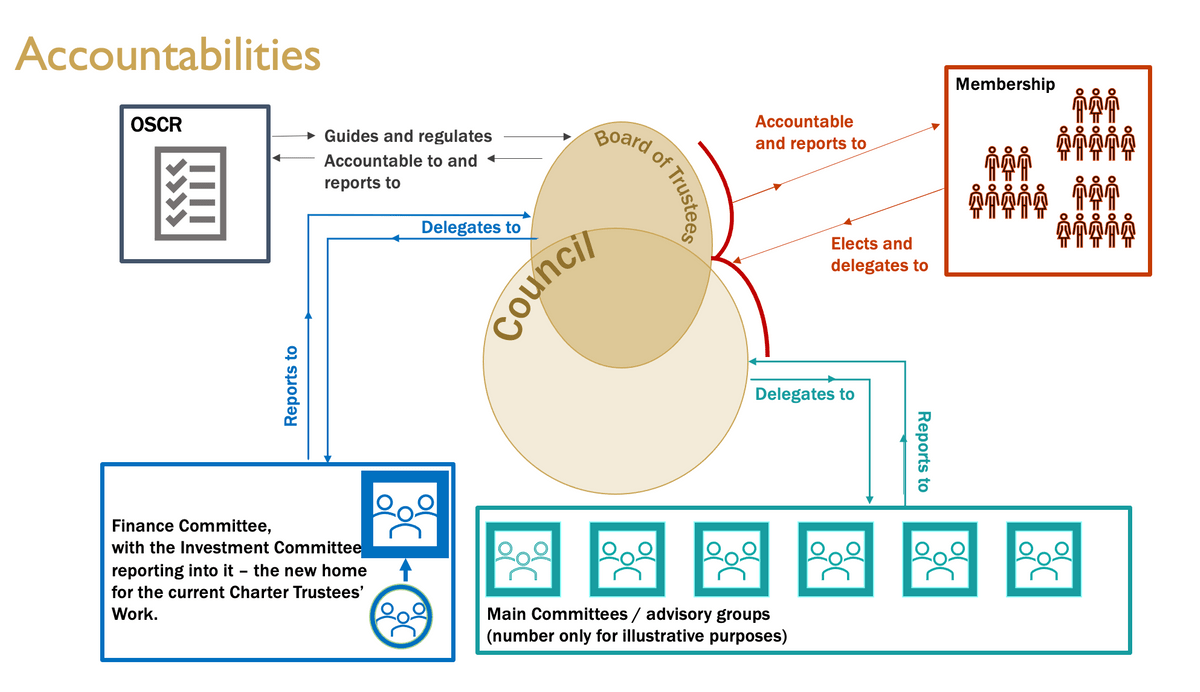


Future governance
- …


Future governance
- …

The main proposals
Proposal 1
The main proposal for change is to create a Board of Trustees, the membership of which would overlap substantially with Council.
The Board of Trustees would have ultimate legal responsibility for the College's activities, and in particular would take responsibility for finance, tax, risk, estate management, reputation management and governance.
The majority of the Board of Trustees would be physicians from Council (ie elected by Fellows and Members, or appointed by people who have been elected by Fellows and Members) and there would be also be up to five Lay Trustees, to bring external expertise.
Council would then be free to focus on its core function of leading the delivery of the College's charitable purposes (quick reminder: these are to promote the science of medicine and to order and improve the practice of that science)
An easier way to say this is that Council will be responsible for "managing the profession" - exactly as it does now, it will:
- help qualified doctors to pursue their careers in specialist (internal) medicine through medical examinations, education and training
- provide resources and information to support and facilitate professional development for physicians throughout their careers.
- help to develop standards of medical care and training, and influence health policy.
- ensure that the views and practical clinical experiences of the membership are taken into account by health policymakers throughout the UK.
The Supporting Details page sets out exactly which roles will sit where.
Proposed new structure
Board of Trustees and Council are two separate bodies, with a substantial overlap.

Proposal 2
The second main proposal is to clarify the role of the group currently known as the Charter Trustees.
The EGM on January 29th confirmed that these five people are, for now, both members of Council and charity trustees.
As explained earlier, the group of Charter Trustees have become an unofficial investment committee, but its current operation does not align well with charity law and modern charity governance.
The proposal here is twofold:
- To stop using the term "Charter Trustee" or "Trustee" to refer only to these five people.
- To create an Investment Committee, which will be a Committee of the Board of Trustees, with delegated authority from the Board of Trustees. The Board of Trustees will operate this Committee in line with charity law, ie the Board will have ultimate responsibility for investment and other financial decision making, after seeking advice from the Investment Committee.
The big picture

Proposal 3
The third main proposal is to provide ways to remove people from the College or from their College roles, if this is in the College's best interests.
Removing Trustees or members of Council
There is a standard list of situations in which a Trustee is removed from office, which derives from Scottish charity law and regulation from OSCR. Council proposes to incorporate this list into the Laws, as follows:
- (unless they are a Lay Trustee) the Trustee or Council Member ceases to be a Fellow or Member of the College
- (if they are an ex-officio Trustee) the Trustee or Council Member ceases to hold the relevant office;
- the Trustee or Council Member is disqualified under the 2005 Act from acting as a Charity Trustee (eg has an unspent conviction for dishonesty, or an offence under the 2005 Act, or has been removed under either Scottish or English Law from being a charity trustee)
- the Trustee or Council Member resigns by written notice to the Board of Trustees;
- the Trustee or Council Member is absent from three [or another number, to be decided] consecutive meetings of the Board of Trustees or Council without agreement from the Board of Trustees or Council;
- the Trustee or Council Member is incapable, whether mentally or physically, of managing their own affairs;
- the Trustee or Council Member has their name erased from the Medical Register by the General Medical Council under section 36 of the Medical Act 1983
- the Trustee or Council Member is removed by a resolution of the members passed at a General Meeting of the College
- if the Trustees consider that it is in the best interests of the College to remove the Trustee or Council member. This would require a majority vote of the Trustees, and the Trustees would be required to follow principles of natural justice, ie the individual in question would have the opportunity to make their case, and the Trustees would be required to listen and take account of it.
Removing Fellows or Members
Council proposes to incorporate the following list of situations in which a Fellow or Member's membership is terminated, and to remove the requirement to hold a General Meeting to approve this.
- if they have their name erased from the Medical Register by the General Medical Council under section 36 of the Medical Act 1983
- if Council, after due enquiry in accordance with the College's disciplinary proceedings, resolves that this will be in the interests of the College
Proposal 4
The fourth main proposal is to go back to three year terms of office for Council members and Trustees.
This was how the College operated for many years, until Council received legal advice stating that this went against the Charter.
At the moment, everyone's term of office is just one year long. Although people are very often re-elected and end up serving what would previously have been a "normal" term of three years, the annual election process is time-consuming, tiring, costly (in terms of staff time and the actual costs of elections) and disruptive.
Annual terms are highly unusual. It is much more common for charities have terms of three or four years, usually with provision to be re-elected for one or two more terms after the first one. There's a good reason for this - it enables people to settle into the role, get up to speed and perform effectively for the majority of their term.
Proposal 5
The fifth main proposal is to strengthen the rights of Fellows and Members.
Council proposes to:
- Give Fellows and Members the power to remove a Trustee or Member of Council (as mentioned above)
- Clarify that Fellows and Members have the power to call a meeting of the College (ie an AGM or EGM), and to put forward a motion to any meeting of the College already called by the Trustees
- Explictly state that the Regulations (see below) must be made available to Fellows and Members at all times, and that Fellows and Members have the right to put forward a motion to an AGM or EGM requesting changes to the Regulations.
Proposal 6
The sixth main proposal is to simplify the administration around updating details of College processes
As described in the "need for change" section, the College cannot make any change to any detail in the Laws without calling an EGM or AGM. Some of these details are very minor, regulating internal processes, and should not require taking up Fellows' or Members' time to change them.
Council proposes to move these minor details into a third governing document, which will be known as "Regulations".
The Trustees will be able to make changes to the Regulations without calling an AGM or EGM. However, the Trustees will be required to make the Regulations available to Fellows and Members at all times - for example, by publishing it on the College's website.
Fellows and Members will also have the power to requisition an EGM to request changes to the Regulations, or to put such a motion to the AGM.
Drafting the Regulations will be a substantial piece of work. At this stage, Council is only asking for Fellow and Member approval of the concept - the actual documents to approve will be presented to you later (ie streamlined Laws, and new Regulations)
What are the benefits?
1The majority of the Board of Trustees will be from Council (ie medical professionals of some kind) - it would be very strange if this was not the case
2Fellows and Members will still elect Council members, some of whom will be on the Board of Trustees (ie there is a democratic mandate, and an unbreakable link between the formal governance of the College and its membership)
3Both the BoT and Council will have the right skills, and will be big enough for diverse voices. There will be external expertise on the Board of Trustees.
4Both the BoT and Council will be small enough so that everyone can make a contribution
5People can focus on what they care about, and play to their strengths (including being a regional representative). People will enjoy their roles more, especially if the pressure to get re-elected every year is reduced to every third year.
6People only have charity trustee duties and liabilities if they knowingly apply for those roles (ie they have effectively given informed consent)
7Everyone will be clear about what they can do, what they must do, and what they cannot do
8It will be easier for Fellows and Members to hold Council and the Board of Trustees to account.
9It will be easier for the College to protect its reputation
We want to hear from you
If you have any concerns, feedback or questions about this section, please get in touch.
You can use the form below to contact us, remembering to click or tap on 'SEND' when you have added your message.
Website created by Wellspring Consulting for RCPE
Proudly built with Strikingly.

